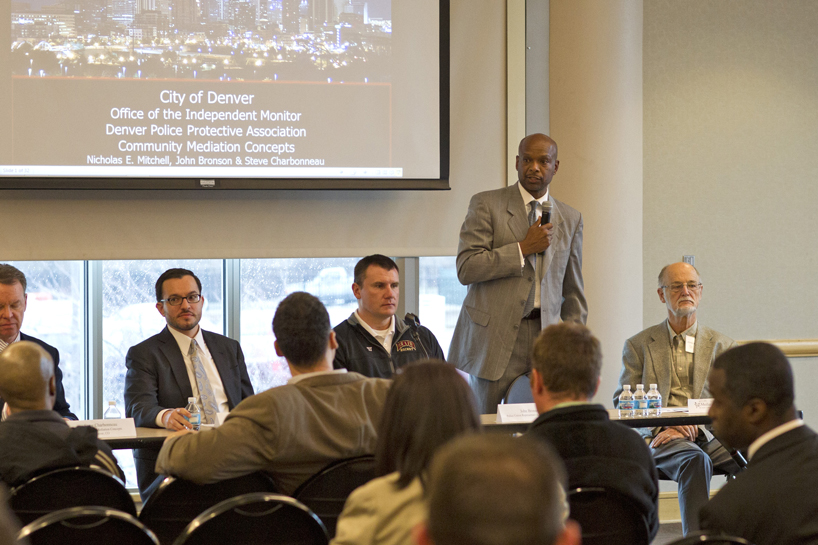
Dan Isom, the Endowed Professor of Policing and the Community at UMSL, introduces panelists from Denver during a discussion on mediation he hosted March 31 at UMSL. (Photo by August Jennewein)
Interactions with law enforcement officers can be either good or bad experiences for many civilians. Sometimes, a situation in the past can tarnish opinions of future encounters.
Dan Isom, the Endowed Professor of Policing and the Community and a member of the Des Lee Collaborative Vision at the University of Missouri–St. Louis, helped establish a mediation program pilot project while he was chief of the St. Louis Metropolitan Police Department. On Monday, he hosted a panel discussion featuring representatives from Denver and invited law enforcement agencies from throughout the region to attend.
What does mediation do? In some cases, if a civilian has filed a complaint against an officer for what they believe to be wrongdoing, having the opportunity to talk with the officer and listen to their side can resolve the issue.
“Many times people just want to be heard, and giving them that face-to-face with the officer and the chance to explain or to hear the officers side, helps and can even change future behavior for all involved,” said Steve Charbonneau, a panel participant and Denver mediator with Community Mediation Concepts.
Denver’s program is a collaboration involving the city police, county sheriff and the nonprofit Community Mediation Concepts, which is based in Colorado. Since the partnership began in 2006, more than 360 conflicts have been resolved.
Nicholas Mitchell with the the Office of Independent Monitor and John Bronson with Denver Police Protective Association also participated in the panel.
The Denver program not only allows for civilians to be heard and impacts future behavior, but it also cuts down on legal expenses and long investigation processes.
“When a complaint is filed, it can cost the city thousands in legal fees, puts a lot of stress on the officer and burden on the department,” said Bronson. “Mediation has allowed citizens to state their grievances and the officer a chance to explain their actions, most times ending with both parties seeing the other’s side.”
Locally, the St. Louis Mediation Services Program, or MediationSTL is a service offered by the Mennonite Peace Center of St. Louis. John Doggette, director of the program, said the goal is to provide a safe and confidential alternative to formal inquiries.
Media coverage:
St. Louis Post-Dispatch














